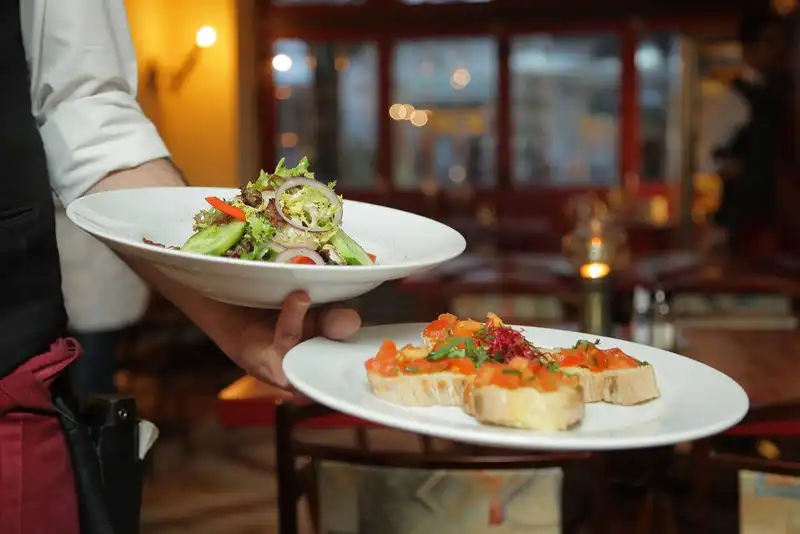What is restaurant franchising?
Franchising is a way for restaurant owners to expand their business by partnering with other business owners. In a franchise agreement, the franchisor grants the franchisee the right to use their name, logo, and business model in exchange for a fee. The franchisee then opens and operates a new restaurant following the franchisor's guidelines. Franchising is a popular option for many restaurateurs because it allows them to grow their business without incurring the full cost of opening and operating new locations. It also gives them access to proven business models and marketing strategies.
How to Start Your Restaurant Franchising Journey on the Right Foot
What is a Restaurant Franchise?
If you're aspiring to enter the restaurant business, it is imperative to know that you will spend much of your workday on your feet. Running a restaurant business is exhausting. Besides investing a huge sum in real estate, you'll need to plan the menu, hire and manage staff, control inventory, plan marketing activities, and oversee finances. However, if you go the franchise route, some of these tasks will be taken care of for you. At the minimum, you'll receive a ready-made template to run your operation. And in some cases, you may also receive support for marketing and advertising.
Franchising a restaurant means the restaurant owner grants another party a license to use the restaurant's name, logo, and operating system. The franchisee needs to pay the franchisor a certain amount as the franchise fee; in return, the franchisor provides them with training, marketing, and support.
The Covid-19 pandemic brought about great upheaval in the restaurant industry, with many businesses shutting down after multiple lockdowns and strict protocols. But now, with economic activities gaining momentum, franchise opportunities are opening up again and several established chains are looking to expand.
Why is Restaurant Franchising a Good Idea?

Let's say you want to open a pizzeria. Starting from scratch, you'll need to find a location, hire architects and contractors, design a menu, develop recipes, and train cooks. You'll need to buy cheese shakers, measuring cups, cutlery, ovens, food processors, food supplies. . . On top of that, you will need to create advertising campaigns, develop a bank of marketing ideas and meticulously plan your business operation, which would involve setting up your order management system, your customer loyalty program, and so on. Whew!
Instead, if you partnered with an established chain like, say, Pizza Hut, they would provide all those things to you in exchange for opening up a new location under their brand. In other words, as a franchisee, you would have access to proven systems for running a successful restaurant, at a much lower risk than going solo.
Pizza Hut follows specific guidelines for anyone interested in partnering with the brand as a franchisor. First, operators must complete an eight to twelve weeks training program at a certified training center in Plano, TX, United States. The pizza chain pays the costs associated with the training program, and the franchisee has to bear the cost of travel and lodging.
But to be a Pizza Hut franchisee, candidates must meet some key requirements. They must show they have experience in the food industry, management, or owning a retail store. They also need strong financial backing, with a net worth of $700,000 and liquid assets amounting to $350,000. In addition, they should have a good credit report and history. Besides, there's an initial investment as a franchise fee of $25,000, a monthly service fee or royalty fee of 6% of the gross sales, and charges for national advertising that cost 4.75% of gross sales.
If the potential franchisee is willing to be hands-on and customer-focused, Pizza Hut will provide support at every step of the way, from site selection assistance and building construction, to initial store operations and marketing.
Every business has its own playbook. Restaurant franchising has one too. Here's a compact guide on what it takes to get a franchise off the ground.
You've been thinking of starting a food franchise but don't know where to begin.
This article will help you out.
No. 1- Establish Your Goals
The first step before you decide to enter the restaurant franchise business is to determine your long-term goal. Do you want to run a fast food or fast casual restaurant, or is it a fine-dining restaurant that interests you? Once you decide your niche, choose the franchisors that work in the segment. The next step is to understand the goals these restaurants are working with and ensure that they align with your own.
In the meantime, do your research. Familiarize yourself with the restaurant industry, restaurant franchises, franchise development, and their inner workings, and review the financial requirements. Look for franchise options that work in your favor. Read reviews, talk to experts and other franchisees who have been closely involved in scaling up the kind of restaurants you're interested in, and attend industry events to grasp the subject better.
No. 2- Plan the Budget
Before taking the plunge into franchising, it's important to sit down and map out a budget. Not only do you have to factor in the initial investment fee, but you also have to be prepared to shell out a huge sum for things like site improvements, and monthly or annual royalty fees. For instance, Denny's requires an initial franchise fee of $30,000, with a total initial investment of $1.3 million to $2.4 million.
By doing your due diligence at the start, you can avoid potential problems or disappointments down the road.
No. 3- Credit Rating and Net Worth

To start a business, you must have enough money to cover initial costs and ensure that you have enough capital for the first year of operation. So, for instance, Denny's requires a franchisee to have $1 million in net worth and $500,000 in liquid capital. Commercial banks are a good place to start because they work with franchisors. Sometimes, people consider borrowing from third party sources such as friends, family, or other investors who want to partner with you in the project. But not all franchisors are open to having multiple stakeholders in the business.
In addition, credit ranking is very important. Most franchisors will accept credit ratings of at least 680, but the higher the ratings are, the better bargaining power you'll have in the deal.
Starting a new business is hard.
There are so many factors that come into play:- your budget, your location, your skillset, and more.
No. 4- Have a Business Plan Ready
A business plan is essential if you want to borrow money to finance your franchise business. Before you start writing your plan, ensure you have all the details from the prospective franchisor and from your own research. Your plan should include estimated investment costs, projected returns, and an executive summary outlining your business goals and objectives.
The sounder your business plan, the better your chances of acquiring franchise ownership. Your business plan will make a big difference in whether or not you are approved for a loan. Understand that Franchise Management isn't easy, and franchisors will want to know your long-term goals.
No. 5- Know Your Franchisor
It's crucial to know a franchisor's history when you're looking to invest in a franchise. This includes knowing how long a franchisor has been in the market, and how many other franchisees it works with. This information will give you insights into the franchisor's ability to maintain profitability and provide growth opportunities for its franchisees. For example, KFC started franchising in 1952 and now has almost 4000 franchisees. On the other hand, Taco Bell has an interesting history, with over 7090 stores operated by 350 franchise organizations. The company changed hands several times at the beginning of its taco journey.
The deeper you go in your research, the more interesting facts about the franchisor will be revealed. It will help you in making a sound, well-evaluated decision.
When considering investing in a franchise, you must also look at other factors, such as the business model, consumer response to the brand, and overall market value.
No. 6- Understand the Deal
Understand the terms and conditions of a franchise deal. It's important to understand the terms and conditions set by the franchisor -- both, your responsibilities and theirs. Rules, regulations, and guidelines can change depending on the region you decide to operate in. These will usually be outlined in the Franchise Disclosure Document (FDD). Ensure you read it thoroughly so that no clauses have been missed.
In addition, get a sense of the support a franchisor is willing to offer you. Support from the franchisor can make all the difference in your success or lack thereof. Get a sense of the backing they provide for training, finances, location assistance, technical expertise, advertising and marketing, and technological investment.
No. 7- Understand the Obligations Involved

Before you commit to a restaurant franchise, you'll need to make sure that all regulatory and legal requirements have been met. In some cases, you might only need to obtain a license and a location for the store; in other cases, you might need experience in insurance, administration, and consumer credit.
For example, McDonald's has 90% of its restaurants under franchise ownership, but its franchising rules are stringent. As a result, new franchisees can only enter the system by purchasing a restaurant from an existing franchisee or from McDonald's USA, LLC.
No. 8- Know the Screening Process
You have done your research and have found a franchisor. After you have submitted your application, the franchisor will want to know if you are a suitable match for their business. A prospective franchisor typically wants to know more about the applicant and how they plan to run their business. They may ask questions related to your finances, and even demand personal details. Besides, franchisors want applicants with specific experience.
For instance, Popeyes Louisiana Chicken seeks entrepreneurs with a proven track record of operating businesses, preferably in the QSR industry. In return, it helps franchisors through ownership development operations. Most franchisors may not list this as an essential prerequisite, but having prior experience in restaurant management may come in handy when applying for a franchise.
Similarly, an applicant at McDonald's has to undergo a comprehensive screening process. A five-step selection process follows it. After your application is reviewed, background and credit score checked, one or several personal interviews may follow. Then, all important financial documents such as tax returns and bank statements are verified. But it doesn't end there. After completing this lengthy process, the franchisee and their team must undergo an extensive training process of 6 to 18 months.
The Upside of Franchising

- When you open a franchise restaurant, you get more than just a building and some equipment. Thanks to years of excellent service and perfectly consistent recipes, you're inheriting a whole team of people who have already established trust with a customer base. For example, when somebody steps into a Starbucks in Texas, they know exactly what to expect in terms of both, the coffee and the food. And that same experience awaits them no matter which Starbucks in North America they visit.
- Quality control is an important aspect of the franchise model. Franchisees can access recipes, processes, suppliers, and equipment that maintain quality standards across locations. It helps them follow the federal rules of food safety easily.
- The franchisor will help the franchisee advertise and promote their business in exchange for royalties and marketing fees. This is a great way for new restaurant owners to get started without worrying about the little details. It doesn't stop there; franchisors will also help a franchisee expand beyond the conventional business model. For instance, McDonald's will help its franchisees set up drive thrus, self-service kiosks, multi unit kitchens and counters, and more, to make its services accessible. Of course, in return for a fee.
The Downside of Franchising
- After covering startup costs and royalties for the restaurant's brand and systems, you'll be giving up a cut of your profits on an ongoing basis. It may pinch you to do this.
- Giving up creative control is also part of the franchise deal. You'll always have to follow the standards set by the corporate office and stick to a menu created by the parent company for a specific region. You can't experiment with cuisines or redesign your menu offerings.
- Although you technically own your business, you're always answerable to the franchisor and must ensure that you meet -- or exceed -- their standards.
The restaurant industry is a tough one, and you want to make sure you’re making the right decision.
You're worried you may have left some important factor unaddressed.



